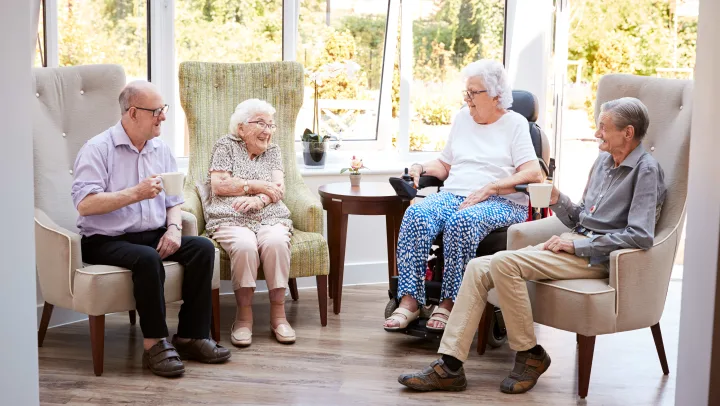Find expert Memory Care staff providing personalized senior care.
Locating the Right Assisted Living Option for Tailored Memory Treatment Programs
The process of choosing an appropriate assisted living remedy for tailored memory treatment programs requires a nuanced understanding of specific needs, specifically as they relate to cognitive disabilities such as Alzheimer's and dementia. As we check out these factors, the concern continues to be: what really comprises an ideal setting for memory care?
Comprehending Memory Treatment Needs
Recognizing the unique memory care demands of individuals with cognitive disabilities is vital for offering efficient assistance and enhancing high quality of life. Cognitive problems, consisting of Alzheimer's disease and other kinds of mental deterioration, substantially influence an individual's ability to process details, communicate, and preserve freedom. Consequently, tailored techniques are crucial in dealing with these difficulties.
People with memory problems frequently experience confusion, mood fluctuations, and disorientation, requiring an encouraging and organized setting. Memory treatment programs need to focus on creating a risk-free area that motivates social interaction, cognitive interaction, and emotional wellness. This can be accomplished with specialized activities, such as memory games, art treatment, and reminiscence sessions, which promote cognitive stimulation and maintain individual identity.

Assessing Staff Certifications
The credentials of employee in memory care programs are vital to supplying high-quality assistance for people with cognitive impairments. Examining personnel qualifications involves examining both educational background and practical experience in senior citizen treatment, specifically in memory-related problems such as Alzheimer's and various other types of dementia.
Seek personnel who have appropriate qualifications, such as Qualified Dementia Specialist (CDP) or specialized training in memory treatment. These qualifications show a dedication to comprehending the complexities of cognitive decline and reliable communication approaches tailored to homeowners' unique needs. Additionally, inquire concerning recurring training possibilities that personnel take part in, as constant education and learning is crucial in an area that evolves swiftly with brand-new study and best practices.
Moreover, assess the staff-to-resident ratio, as this straight affects the quality of treatment. A lower ratio permits more personalized focus and involvement with homeowners. Observe personnel communications with present residents to determine their compassion, patience, and capability to link. Ultimately, a professional group is critical in cultivating an environment that boosts the dignity and lifestyle for individuals in memory treatment.
Importance of Personalized Care Plans
Customized care plans play an essential role in boosting the wellness of individuals in memory care programs. These plans are tailored to the one-of-a-kind demands, choices, and abilities of each local, making certain that treatment is both relevant and reliable. By thinking about variables such as medical background, cognitive feature, and personal rate of interests, caretakers can create a thorough method that advertises self-respect and respect for every person.
The value of individualized care plans expands beyond basic care requirements; they foster a complacency and knowledge, which is crucial for individuals experiencing memory difficulties. By addressing particular behavior patterns and psychological reactions, caregivers can apply approaches that lower anxiety and improve general lifestyle.
In addition, individualized treatment plans facilitate far better interaction among staff, member of the family, and health care providers. This joint strategy ensures that every person involved is educated and lined up in their treatment initiatives, bring about even more consistent and efficient support. Inevitably, a well-structured tailored treatment strategy is important in memory care programs, as it not only enhances daily living experiences however additionally adds to the lasting health and joy of citizens.
Engaging Activities and Programs

Activities such as art therapy, music sessions, and reminiscence treatment give methods for self-expression and cognitive involvement. These purposeful interactions not just aid in maintaining cognitive capacities yet likewise use psychological benefits, reducing sensations of seclusion and anxiety that commonly go along with memory loss.
In addition, organized group activities can encourage socializing, which is essential for psychological wellness - Memory Care. Routine involvement in video games, exercise classes, and community outings develops an atmosphere of sociability and support. Tailored programs that consider private passions and backgrounds additionally boost interaction, making activities much more purposeful and reliable
Integrating innovation, such as memory video games and online reality experiences, can likewise offer to enrich the every day lives of citizens, providing ingenious ways to stimulate cognitive function. Inevitably, a focus on appealing activities and programs is important for promoting an encouraging atmosphere that promotes alternative wellness in memory treatment settings.

Assessing Neighborhood Atmosphere
When evaluating an area setting for memory treatment programs, it is crucial to take into consideration elements that add to the overall health and safety and security of locals. The physical format of the neighborhood should prioritize ease of access and navigating, reducing barriers while giving clear signs and acquainted landmarks. A protected environment is crucial to prevent homeowners from wandering, which can present security threats.
In addition, the sensory facets of the community, such as lights, color design, and noise levels, play a significant duty in improving comfort and minimizing stress and anxiety among citizens. Natural light and outside rooms promote engagement with nature, fostering weblink a relaxing ambience that can benefit cognitive feature.
Another crucial facet is the availability of experienced team that understand the one-of-a-kind demands of individuals with memory disabilities. Staff ought to be equipped to create a nurturing environment that urges social communication and psychological assistance.
Finally, the feeling of area and belonging is crucial. Involving family involvement and chances for locals to develop links with peers can substantially boost their general lifestyle. Assisted Living. By thoroughly analyzing these factors, families can make informed decisions about one of the most appropriate memory treatment community for their loved ones
Verdict
Finally, picking a proper assisted living solution for tailored memory treatment programs demands a thorough examination of specific requirements and choices. Prioritizing staff qualifications, customized treatment plans, involving tasks, and a helpful neighborhood atmosphere is necessary for boosting the lifestyle for citizens dealing with cognitive difficulties. By resolving these important aspects, families can guarantee that their enjoyed ones get the needed assistance and like promote emotional well-being and cognitive stimulation in a nurturing setting.